News
Fish Conditioning: Do fish become conditioned by contact with divers?
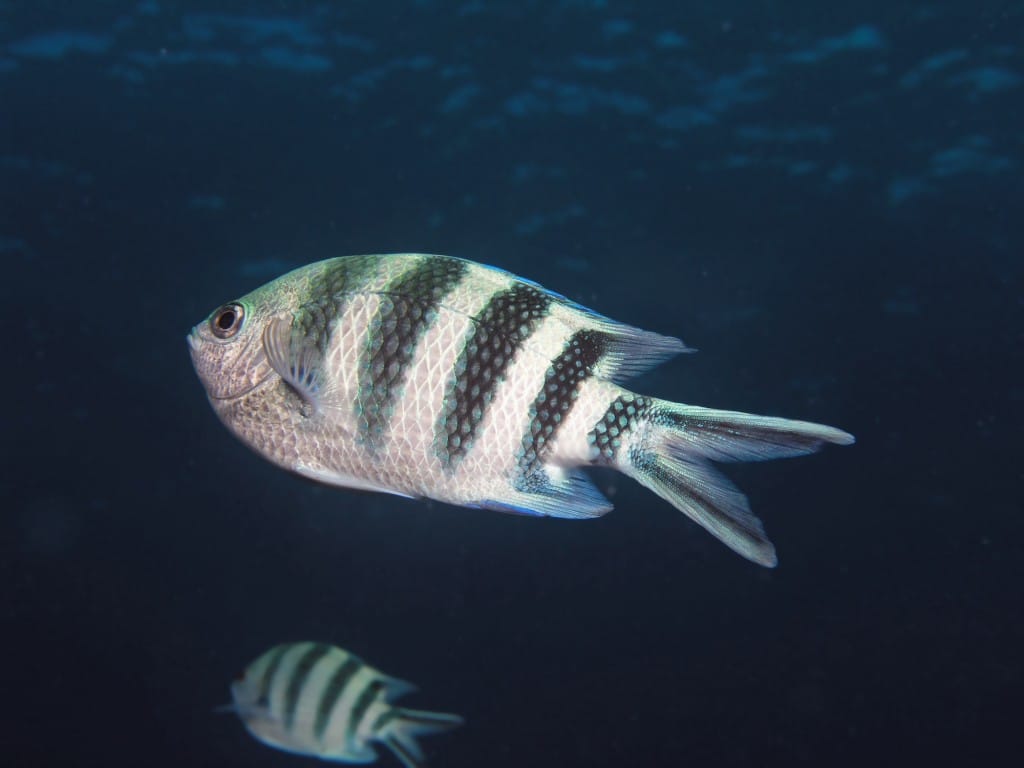
In Mauritius, some of the species are completely relaxed, and others extremely nervous around divers. The most remarkable are the sharks in the shark pit in Mauritius. We have been there with a small group to find as many as 23 sharks finning around in the washing machine current. To them we do not exist. They completely ignore us.
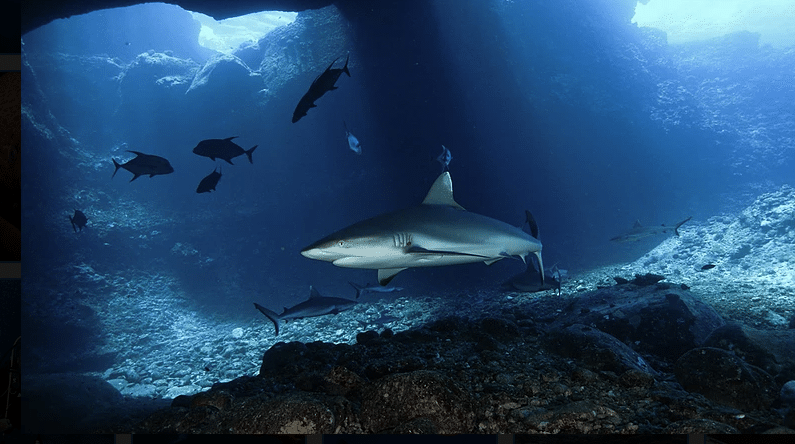
Once they have got used to the fact that the air-breathers are harmless they go about their business happily, unafraid of the invaders.
In Mozambique the Potato Bass are happy to interact with divers, lying on the sand, eyeing them hopefully, swimming beside them and rubbing against them. The legendary Bert was among these.
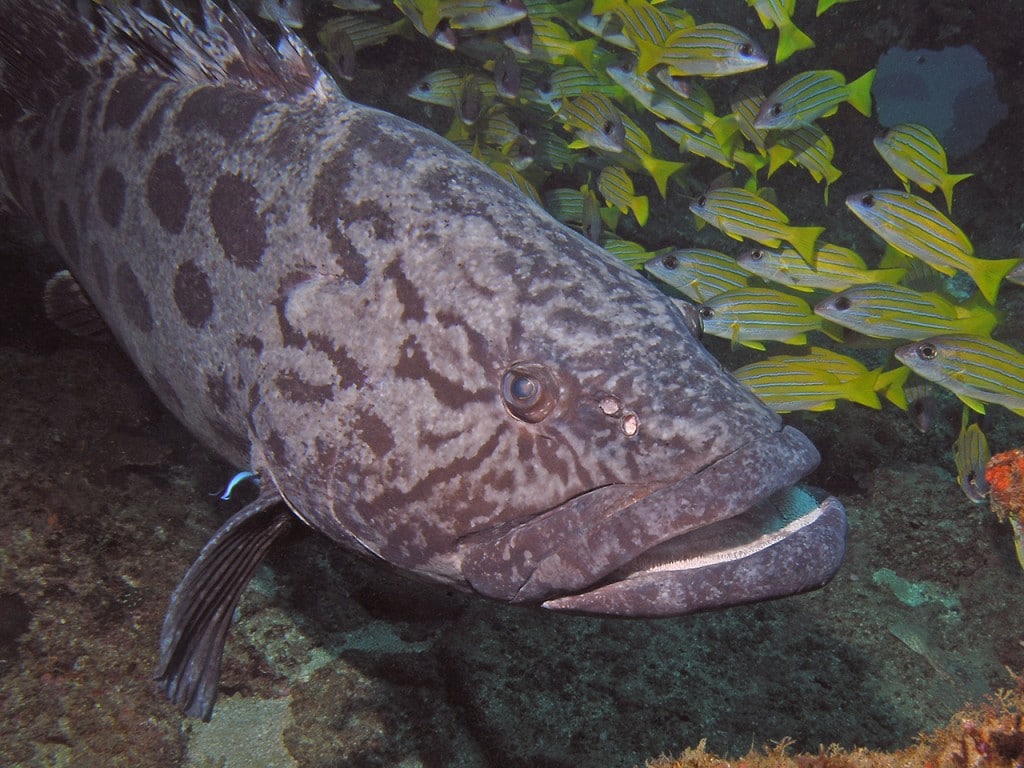
The controversy over Cage Diving and chumming for sharks rages on, and although we enjoy the adrenalin rush of the Tiger Shark Dive at Aliwal Shoal, there is always a nagging doubt that we are supporting something that could lead to later danger. It is extremely rare for a diver to be attacked by a shark, unless he is in a bait ball or in the wrong place, or behaves foolishly. The Dive Operators who offer these extreme experiences have never themselves felt in any danger.
The raggies at Aliwal shoal are like bull terriers. They are completely familiar with divers, and they are unfazed by photographers. The pregnant females at Sodwana fin trance-like around groups of divers.
I watched Walter Bernardis brush a piece of sardine away from my buddy’s head just as a Black Tip was diving for it, and the Black Tip veered away from his hand. Shark diving is exhilarating, but I have never felt threatened by the animals themselves. After five years of diving with the Tigers, I have noticed that the grey reef and black tips that come to feed are no longer wary of divers. They brush you out of the way to reach the bait ball. Once they lose their fear of divers, these sharks are completely relaxed in the water.
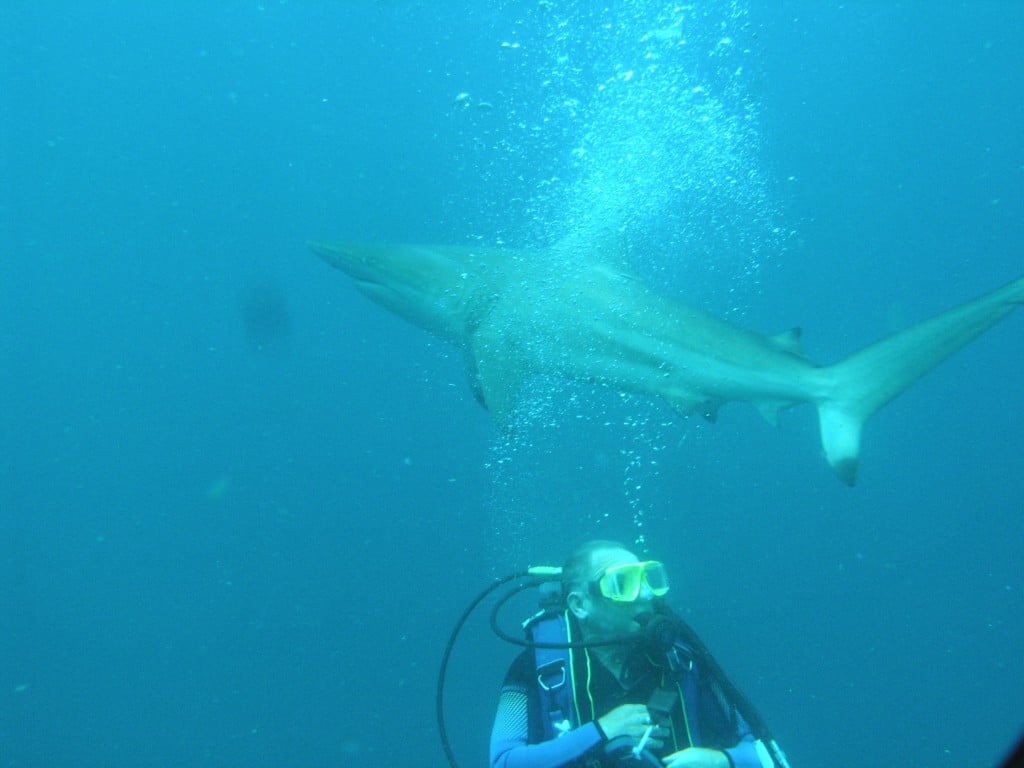
The one animal that always seems completely aloof, has never changed, and which completely ignores diver and which typifies the apex predator is the Tiger. Nothing changes their behaviour that I have ever seen. They are always looking for something to taste. They are always alert to anything new in their world. They will always nibble on anything unfamiliar, and a nibble from a tiger can remove most of your torso.
Is it a bad thing for fishes to become conditioned to the presence of divers in their private domain? Theoretically, anything that changes the behaviour of a creature in its natural habitat is unwarrantable interference. However, the test of stress in a creature is whether it continues to live, to eat and to breed and the evidence of stress-free fish life is everywhere.
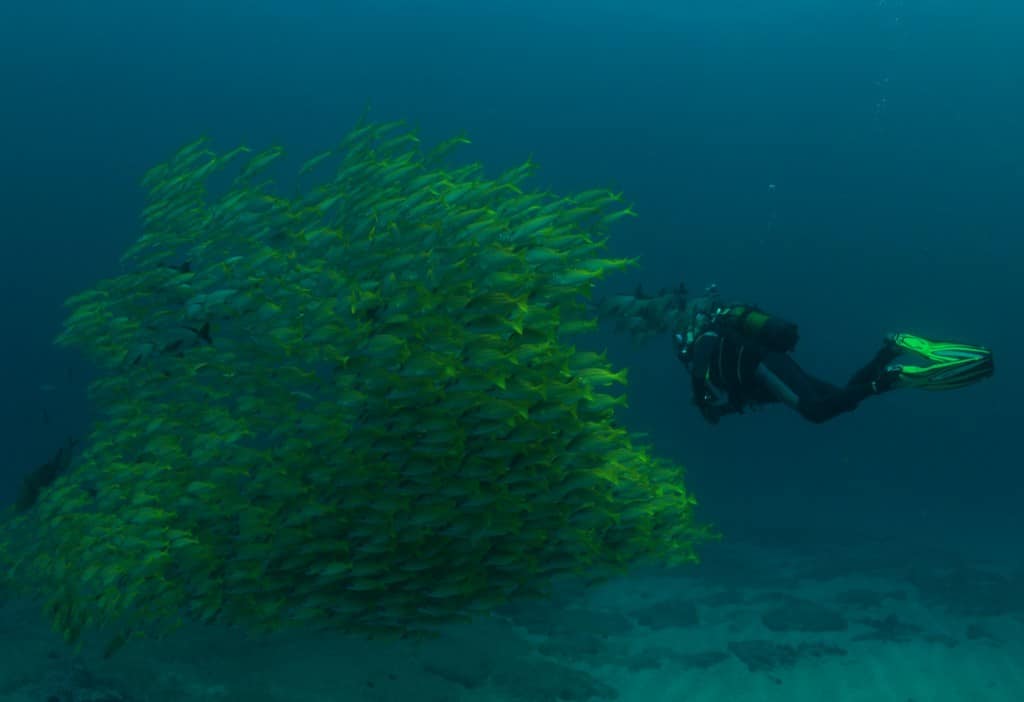
In the bad old days, Dive Masters in Mauritius used to conceal pieces of uneaten cheap Government bread in their BC pockets. Unnoticed by the early naiive Resort Course divers, the DMs crumble the bread into the water around them, and are soon mobbed by shoals of damsels, who like nothing more than a little French loaf for breakfast.
When you dived with certain Dive Operators there you had to swat away the aggressively seeking damsels. They bit your hands or the naked areas on your face. Their teeth are too small to draw blood, but the nip was painful nonetheless. Conditioned to expect something from divers? Absolutely.

At Sodwana Bay on Stringer Reef and on Quarter Mile Reef the Sergeant Majors (Abdadufduf abdadufduf ) lay their eggs in nests in the hollows of the eroded rocks and caverns. In December they can be seen hovering anxiously over their nests, but if a diver gets too close they dart away, and the wily wrasses pile in and gobble their eggs.
Incredibly, the Wrasses know they fear divers, and we have often been plagued by colourful wrasses weaving seductively in front of the camera lens, and then darting towards the Sergeant Majors’ nests hoping we will follow them. It’s almost as though they are saying, “Come on guys, come and look at these eggs, come and photograph these fish.” We have often seen pairs of mournful-looking Sergeant Majors rushing back to their eggless nests after an oblivious dive group has finned down for a closer look.
Conditioning? Looks like it.
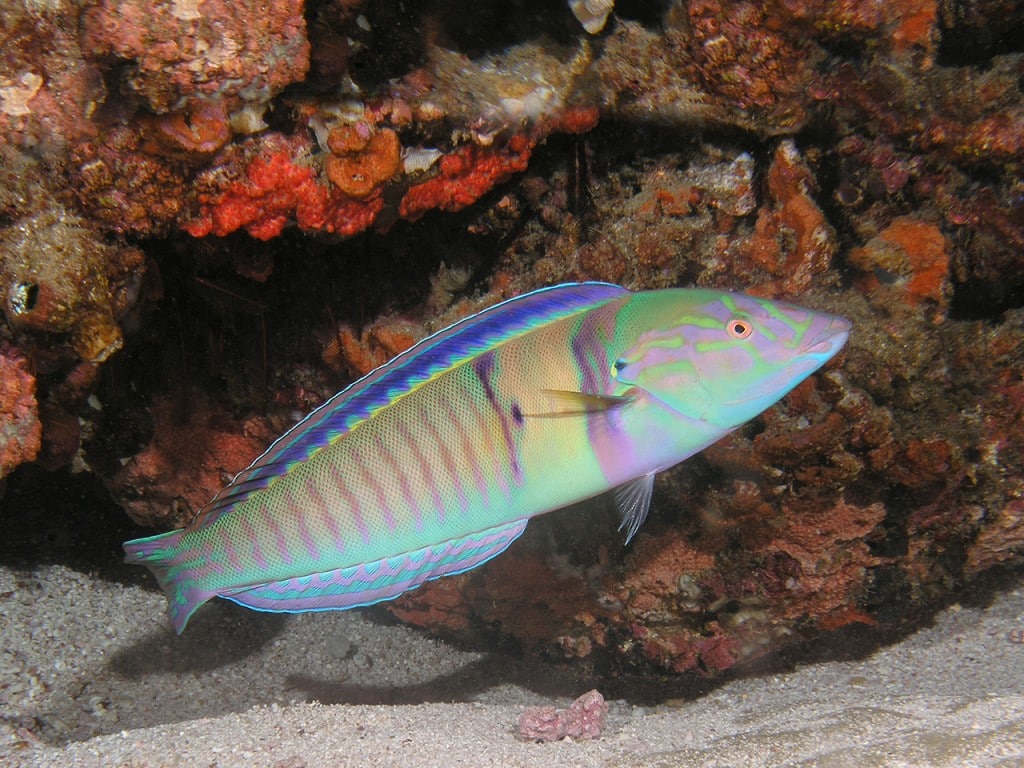
Less obvious conditioning is on new or undiscovered reefs, where the fish are much more nervous when a group of divers arrives, and whole shoals will fin away from the intruders. I’ve seen this happen at little –known Reefs like Fusilier, or Snapper College at Sodwana.
Perhaps, just as we are learning about Reef Fish, they are learning about us – and if their behaviour is anything to go by, once they get to know us, they simply accept us.
Words Jill Holloway
Pic David Holloway
Copyright Ocean Spirit
Gear News
Introducing the TR-80, IR-50 and CS-30 Regulators from DYNAMICNORD

Whether you are a beginner or a professional diver – with the three new main regulators from DYNAMICNORD, everyone will find their favourite regulator. They all look super stylish.
Excellent performance with the TR-80
Quality and performance are the be-all and end-all for regulators. It is not for nothing that the TR stands for Tec Reg. The innovative design of the TR-80 guarantees absolute reliability – even in ice-cold waters.

Perfect breathing effort at 0.8 J/l / certified for diving in waters below 10 degrees / structural design made of solid brass for best cold protection / membrane-compensated design with dry seal of the first stage / reduced exhalation effort thanks to optimized exhalation membrane and bubble deflector / adjustable Venturi (dive/predive) and adjustment knob for individual inhalation comfort / innovative design of the front cover prevents free-flow in strong currents or when diving with scooters / design made of sandblasted brass, matt chrome finish / 2 HP and 4 LP outlets / mouthpiece made of high-quality, anti-allergic silicone for maximum comfort.


Amazing underwater adventures with the IR-50
The IR-50 is the top regulator for advanced and experienced divers. Natural breathing is the essence of this regulator.

Ideal breathing effort at 0.8 J/l /certified for diving in waters below 10 degrees / compensated membrane / adjustable venturi (dive/predive) and adjustment knob for individual inhalation comfort/ outlet valve and deflector for minimum exhalation effort and reduction of bubbles on the face / design made of sandblasted brass, matt chrome finish / 2 HP and 4 NP outlets / mouthpiece made of high-quality, anti-allergic silicone for maximum comfort.


The Workhorse – our CS-30
For diving centres and diving beginners – the workhorse stands for strong construction, reliability and robustness. Perfect for your training.

Optimal breathing effort at 0.8 J/l /recommended for diving in waters above 10 degrees / non-compensated piston / adjustable venturi (dive/predive) / outlet valve and deflector for minimum exhalation effort and reduction of bubbles on the face / design made of sandblasted brass, matt chrome finish / 1 HP and 3 NP outlets / mouthpiece made of high-quality, anti-allergic silicone for maximum comfort.


Octopus OP-30
The OP-30 is the ideal addition to all DYNAMICNORD regulators. It is identical in construction to the CS-30.

The TR-80, IR-50, CS-30 (DIN & INT) regulators and the Octopus OP-30 are available from DYNAMICNORD dealers and in the online store.
DYNAMICNORD – Your Outdoor Companion.
Marine Life & Conservation
Paul Watson Released as Denmark Blocks Japan’s Extradition Bid

Renowned anti-whaling activist Paul Watson has been released from custody in Greenland after spending five months in detention. Denmark’s Justice Ministry rejected Japan’s request for his extradition, citing insufficient guarantees that his time already served in custody would be credited against any potential sentence.
The 74-year-old Canadian-American was arrested on July 21 in Nuuk, Greenland’s capital, when his ship docked to refuel. His arrest was based on a 2012 Japanese warrant related to a 2010 encounter in Antarctic waters. Japan alleged Watson obstructed operations and caused damage to a whaling research ship during efforts to disrupt illegal whaling. Watson has consistently denied these claims, maintaining his commitment to marine conservation.
Denmark, which oversees extradition matters for Greenland, concluded that while the legal conditions for extradition were met, the lack of assurances from Japan regarding time-served credit made extradition untenable.
In a video shared by his foundation, Watson expressed gratitude and relief, saying, “After five months, it’s good to be out… and good to know they’re not sending me to Japan.” He added that the most difficult part of his time in custody was being separated from his two young sons.
Watson is a pioneering figure in marine conservation, known for founding the Captain Paul Watson Foundation in 2022 after decades of activism with the Sea Shepherd Conservation Society. His bold efforts to defend marine life have earned him widespread support, including from celebrities and conservationists. His work has also been featured in the acclaimed reality TV series Whale Wars.
Watson’s lawyer, Jonas Christoffersen, praised the decision, stating, “We are happy and relieved that Paul Watson is now free.” He added that Watson is eager to reunite with his family and continue his vital work.
The arrest occurred while Watson’s vessel, the M/Y John Paul DeJoria, was en route to the North Pacific with a team of 26 volunteers to intercept a Japanese whaling ship. His foundation described the arrest as politically motivated and emphasized that Watson’s actions were focused on ending illegal whaling practices.
Japan resumed commercial whaling in 2019 after leaving the International Whaling Commission, asserting that whale meat is a cultural tradition. Conservationists, however, continue to challenge these practices, highlighting their impact on marine ecosystems.
Despite the challenges, Watson remains steadfast in his mission to protect marine life and bring attention to whaling practices. His dedication to ocean conservation has made him a globally respected advocate for the environment.
-

 News2 months ago
News2 months agoIconic SS United States to become the World’s Largest Artificial Reef
-

 News3 months ago
News3 months agoBook Review – 52 Assignments: Underwater Photography
-

 Gear News3 months ago
Gear News3 months agoDYNAMICNORD – New German diving brand enters the British market
-

 News3 months ago
News3 months agoExploring Cenote El Pit: A Diver’s Dream
-

 Gear News3 months ago
Gear News3 months agoTry BARE drysuits (and maybe even win one!) this Friday with Sea & Sea at North West Dive Fest
-

 Marine Life & Conservation3 months ago
Marine Life & Conservation3 months agoBook Review: Coral Triangle Cameos
-

 Blogs2 months ago
Blogs2 months agoDive the Egyptian Red Sea this Autumn with Regaldive
-

 News3 months ago
News3 months ago2024 Ocean Art Underwater Photo Competition Announced















